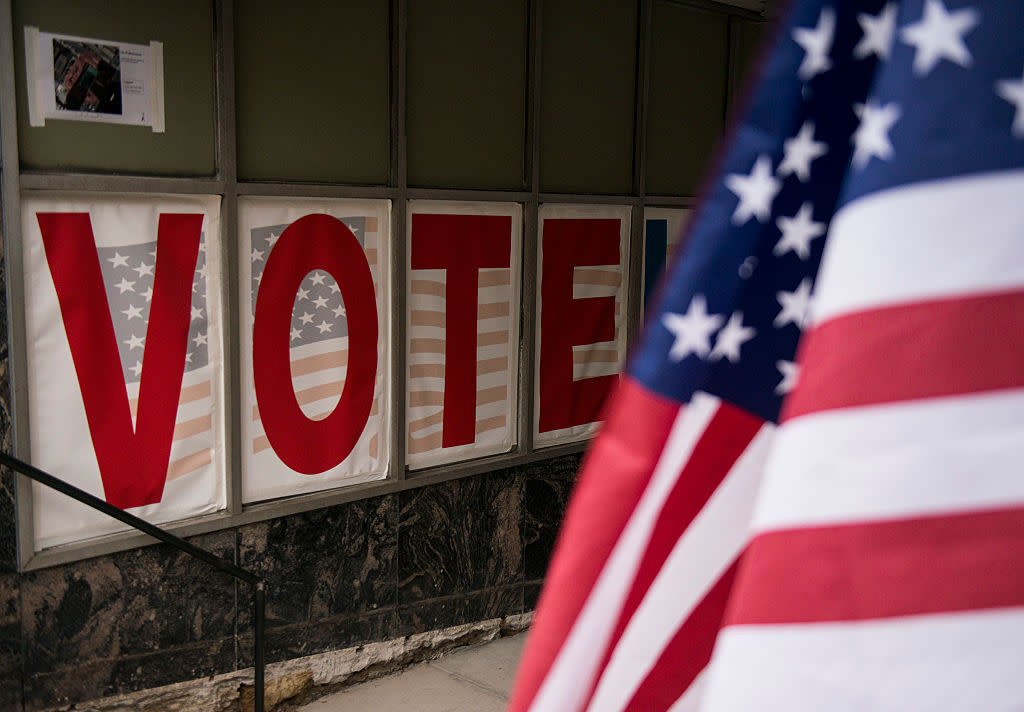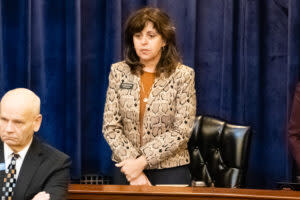717 bills have been drafted. Not one fixes the disenfranchisement of thousands of Idaho voters.

- Oops!Something went wrong.Please try again later.
- Oops!Something went wrong.Please try again later.
Instead of a caucus, Idahoans deserve to vote in a presidential primary election, which offers more access to the ballot and verified, observable results, writes Idaho Capital Sun editor-in-chief Christina Lords. (Stephen Maturen/Getty Images)
Idaho legislators have been working at a breakneck pace this legislative session.
Since Rep. Julianne Young, R-Blackfoot, introduced on Jan. 9 the first bill of the session, which would have replaced the term “fetus” with “preborn children” in Idaho law, lawmakers have worked to draft 717 bills – and counting – in 2024. That’s a record pace over the last five years. For example, 570 bills were drafted by this point in the 2023 legislative session, while just 511 were drafted by this time in 2019.
Noticeably absent from any of the introduced legislation so far this year, however, is a fix to ensure all Idahoans have a say in who the next U.S. president will be.
On Saturday, Idaho Republicans will caucus for the first time since 2012 due to a major, albeit inadvertent, mistake in a piece of 2023 legislation that removed the state’s presidential primary election in March from the books.
This mistake, which legislators had the opportunity to fix during last year’s legislative session through a follow-up bill or by calling a special legislative session before an important Oct. 1 Republican National Committee deadline, will almost certainly mean far fewer Idahoans participate in voting for their political party’s presidential nominee. Legislators’ refusal to address this very real problem facing the state will also disenfranchise those who deserve to have a say perhaps as much or more so than any other group: our U.S. military service members.
We know from several data points where Idahoans stand on this issue.
State election data shows that far more voters participate in a primary election than a caucus. For example, during the 2012 Republican presidential caucus, 44,672 people participated, the Spokesman-Review reported. But when the Republican Party switched to a primary election during the next presidential election in 2016, turnout increased to more than 225,000 voters, according to the Idaho Secretary of State’s Office.
In 2020, more than 228,000 Idahoans across all parties participated in the presidential primary election.
Indeed, the most recent Idaho Public Policy Survey showed that “Idahoans favor a primary election (74%) over a caucus (13%) and for U.S. presidential and Idaho state primaries to be held on the same day (74%).”
After robust presidential primary election participation, how did Idaho get here?
So how, then, have we found ourselves in a place where political parties are holding a caucus and far fewer Idahoans are likely to participate due to those caucus rules in 2024?
With little debate or vetting last year, the Idaho Legislature overwhelmingly passed House Bill 138, which was pushed by Secretary of State Phil McGrane and Rep. Dustin Manwaring, R-Pocatello, as a way to consolidate elections and save the state about $2.7 million every four years.
Idaho Secretary of State Phil McGrane attends the State of the State Address at the State Capitol building in Boise on Jan. 8, 2024. (Otto Kitsinger for Idaho Capital Sun)
Idaho had been conducting its presidential primary election on the second Tuesday in March. But Manwaring and McGrane said their law was designed to eliminate the March presidential primary election and move it back to another state election day: the third Tuesday in May.
McGrane said he worked hard during the end of the 2023 legislative session to fix the mistake in House Bill 138 by bringing forward Senate Bill 1186, which was designed to add language necessary to actually move the primary election to May.
This problem could have – and should have – ended there.
However, that bill died in House State Affairs Chairman Brent Crane’s committee on March 30 after Idaho Republican Party Chairwoman Dorothy Moon interceded. She called for a solution where Idahoans could vote for their party’s nominee for president in March, when candidates were more likely to still be actively campaigning for delegates and before the party’s race was essentially decided.
She spoke out against Senate Bill 1186, and consequently none of the legislators on the committee made a motion to advance the bill.
Then, for weeks last fall, there was talk of bringing the Legislature back into a special session – something the Legislature itself can now do after a 2022 constitutional amendment passed by nearly 52% of voters giving legislators that very authority. But the special session, inexplicably, never happened because legislators still couldn’t agree on when Idahoans should vote: March or May.
To this day, it seems they still can’t.
How does a presidential primary election and a caucus differ?
Which leaves us now with the archaic process that is a caucus. Originally used in the 1800s to educate voters of a political party about candidates in the race – and before a time where the internet, television, radio, social media and the news media reached most Americans – the caucus has several glaring and unfair disadvantages for most Idaho voters.
The most obvious and egregious flaw of this outdated process? Only folks who can show up at 11 a.m. Pacific time in the northern part of the state and noon Mountain time in the southern part of the state for about an hour or two on Saturday can participate in this year’s GOP caucus.
Serving a religious mission out of state? The GOP has no voting option for you.
Recovering in a hospital bed after surgery? Nope. Sorry.
Working that day and can’t get time off from your employer? You’re excluded.
Need child care during that time so you can make it? That’s your problem, although Moon said she encourages participants to bring their children with them to the GOP caucus sites.
And, perhaps most seriously, are you serving our nation in the U.S. military far away from home? If you can’t be there at that specific time, in person, on Saturday, you cannot participate.
Longtime Republicans are recognizing just how unfair this process is – and some are calling out Moon by name as “standing at the forefront of this controversial move.”
“Deployed military personnel, already enduring significant challenges, are now faced with the additional burden of participating in an on-site caucus, a process that demands considerable time and effort,” Marv Hagedorn, a former Republican Idaho legislator and retired Navy chief warrant officer, wrote in a recent opinion column denouncing the inability of activity duty personnel to participate. “It is ironic that a change allegedly aimed at promoting civic engagement within the Republican Party is, in fact, suppressing the voices of those who have dedicated their lives to upholding our own right to vote and express our opinions.”
Not providing absentee voting options for residents who cannot make this ultra specific time slot on this ultra specific day, especially for our service men and women, is an embarrassing and undemocratic decision that we should not simply sit back and get comfortable with.
Another flaw of this process? Caucuses, by their nature, are paid for and run completely by the political party itself – not county and state elections officials.
This can create confusion among voters about where to show up; their caucus site will likely be different than their usual polling locations. The caucus dates themselves are even confusing: The Idaho GOP will caucus on March 2, while the Idaho Democrats will hold their presidential caucus months later on May 23. Between now and then, Idahoans will also be asked to go to the polls on May 21 for the state’s primary election, where all 105 state legislative seats are up for consideration.
The results of the GOP caucus will be tabulated – by hand – by the political party.
The transparency – or lack thereof – of this caucus is also something we should all be cautious of.
During state-run Idaho elections, independent poll watchers are allowed to be present at each of the polling locations. Yet there are no independent poll watchers allowed at the GOP caucus – only registered Republicans voting at the caucus, the presidential candidates themselves or a candidate’s representatives are allowed to observe the counts.
And this is important, because the Republican Party has spent the better part of the last four years crying out for election transparency and integrity. But since 2022, the Idaho GOP been led by a chairwoman who asserted that the 2020 election results were fabricated in favor of President Joe Biden. Moon did so while running for secretary of state, the very position tasked with ensuring Idaho elections run smoothly and, most importantly, fairly.
Idaho GOP chairwoman Dorothy Moon has a history of proposing legislation to make it harder to vote
Idaho voters should recognize that Moon has, for years, advocated for the GOP’s harmful closed primary where Republican candidates pander to the far-right of its base and, as a state representative, consistently introduced legislation that would make it harder for residents to vote.
In this file photo, Rep. Dorothy Moon, R-Stanley, works from the House floor at the Idaho Capitol on Jan. 17, 2022. (Otto Kitsinger for Idaho Capital Sun)
It should come as a surprise to no one that she supports a caucus that will do the same.
In 2022, while Moon was still an Idaho legislator, she introduced House Bill 761 that would have eliminated the use of student IDs to vote in Idaho, would have eliminated the ability of a voter to sign a legal affidavit to verify their identity to vote and would have added burdensome proof-of-citizenship requirements for Idahoans who registered on the same day of an election.
That was actually her third attempt that year to make it harder for Idahoans to cast a ballot.
Moon’s widespread changes to voter registration and identification laws proposed in 2022 included:
House Bill 549, which would have repealed same-day voter registration in Idaho. During that bill’s introductory hearing, Moon never disclosed her bill would repeal same-day registration. That’s vitally important, because many Idahoans do register on Election Day. For example, more than 87,000 voters registered and then voted on Election Day in 2020, according to election results available on the Idaho Secretary of State’s website.
House Bill 692, which was similar to House Bill 761, included flawed provisions requiring voter registration forms be mailed only to a person’s residence, even if that person cannot accept mail delivery at their residence. Many rural Idahoans, for example, cannot get mail at their residences and use P.O. boxes instead. Moon eventually pulled House Bill 692 back from the House floor.
During the floor debate on House Bill 761, she irresponsibly said, without evidence, that Canadians were coming into Idaho to cast ballots in our elections illegally.
While making these fraudulent voting claims, she proposed these changes to Idaho voting law all in the name of, you guessed it, election integrity.
“What we need is an election integrity bill that’s going to make people feel that we are all following the rules,” Moon told the Idaho House at the time.
So you would think public access and active observation to the proceedings during the upcoming caucus would be paramount to the GOP and to Moon then, right?
Nah.
Conveniently, the Idaho Republican Party states in its rules that only registered Republicans and their minor children will be allowed into caucus sites. That means, unlike a primary election run by our dedicated county clerks and overseen by the Secretary of State’s Office, members of the Idaho press will have no way of knowing what happens in any of these 210 caucus sites on Saturday. They’ll have no way to observe the proceedings and know the true testament of their outcome.
Are we to trust a chairwoman who has mislead the public repeatedly about recent local and national elections while simultaneously also trying to make it more difficult for everyday Idahoans to participate in the political process?
Are we going to allow this to go on without challenge or solution?
Is there not a single legislator who can find the time among these 717 pieces of draft legislation to come forward with a bill to address this flawed caucus situation for the voters of our state?
We should demand that they do before it’s too late and we find ourselves still here in the 2028 presidential election cycle.
Because if we can find the time to introduce hundreds of pieces of legislation – including legislation that allows patrons to sue community and school libraries for the content they provide — we can introduce a bill to fix this mess.
If we can find the time to introduce legislation that would defund diversity programs and women’s centers that students across Idaho’s university campuses hold dear, we can introduce a bill that would rightfully allow voters more options to cast a ballot for a party’s nominee for president – voters who may be working, who may be sick, who may be serving a religious mission, and especially those may be serving our nation’s military.
And if we can find the time to introduce legislation to expand a law to outlaw cannibalism due to unfounded fears of human composting getting into the food supply, we can surely introduce a bill to bring back the state’s presidential primary election in perpetuity and put the caucus process where it truly belongs – in Idaho’s past.
GET THE MORNING HEADLINES DELIVERED TO YOUR INBOX
The post 717 bills have been drafted. Not one fixes the disenfranchisement of thousands of Idaho voters. appeared first on Idaho Capital Sun.



